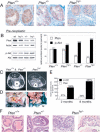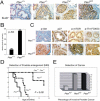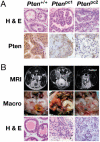Pten dose dictates cancer progression in the prostate
- PMID: 14691534
- PMCID: PMC270016
- DOI: 10.1371/journal.pbio.0000059
Pten dose dictates cancer progression in the prostate
Abstract
Complete inactivation of the PTEN tumor suppressor gene is extremely common in advanced cancer, including prostate cancer (CaP). However, one PTEN allele is already lost in the vast majority of CaPs at presentation. To determine the consequence of PTEN dose variations on cancer progression, we have generated by homologous recombination a hypomorphic Pten mouse mutant series with decreasing Pten activity: Pten(hy/+) > Pten(+/-) > Pten(hy/-) (mutants in which we have rescued the embryonic lethality due to complete Pten inactivation) > Pten prostate conditional knockout (Pten(pc)) mutants. In addition, we have generated and comparatively analyzed two distinct Pten(pc) mutants in which Pten is inactivated focally or throughout the entire prostatic epithelium. We find that the extent of Pten inactivation dictate in an exquisite dose-dependent fashion CaP progression, its incidence, latency, and biology. The dose of Pten affects key downstream _targets such as Akt, p27(Kip1), mTOR, and FOXO3. Our results provide conclusive genetic support for the notion that PTEN is haploinsufficient in tumor suppression and that its dose is a key determinant in cancer progression.
Conflict of interest statement
The authors have declared that no conflicts of interest exist.
Figures






Similar articles
-
PTEN deficiency is fully penetrant for prostate adenocarcinoma in C57BL/6 mice via mTOR-dependent growth.Am J Pathol. 2009 May;174(5):1869-79. doi: 10.2353/ajpath.2009.080055. Am J Pathol. 2009. PMID: 19395652 Free PMC article.
-
Increased AKT activity contributes to prostate cancer progression by dramatically accelerating prostate tumor growth and diminishing p27Kip1 expression.J Biol Chem. 2000 Aug 11;275(32):24500-5. doi: 10.1074/jbc.M003145200. J Biol Chem. 2000. PMID: 10827191
-
Cooperation between FGF8b overexpression and PTEN deficiency in prostate tumorigenesis.Cancer Res. 2006 Feb 15;66(4):2188-94. doi: 10.1158/0008-5472.CAN-05-3440. Cancer Res. 2006. PMID: 16489020
-
Akt-regulated pathways in prostate cancer.Oncogene. 2005 Nov 14;24(50):7465-74. doi: 10.1038/sj.onc.1209096. Oncogene. 2005. PMID: 16288293 Review.
-
The Par-4/PTEN connection in tumor suppression.Cell Cycle. 2009 Aug 15;8(16):2518-22. doi: 10.4161/cc.8.16.9384. Epub 2009 Aug 29. Cell Cycle. 2009. PMID: 19625770 Free PMC article. Review.
Cited by
-
Angiogenin mediates androgen-stimulated prostate cancer growth and enables castration resistance.Mol Cancer Res. 2013 Oct;11(10):1203-14. doi: 10.1158/1541-7786.MCR-13-0072. Epub 2013 Jul 12. Mol Cancer Res. 2013. PMID: 23851444 Free PMC article.
-
SPRY2 loss enhances ErbB trafficking and PI3K/AKT signalling to drive human and mouse prostate carcinogenesis.EMBO Mol Med. 2012 Aug;4(8):776-90. doi: 10.1002/emmm.201100944. Epub 2012 May 31. EMBO Mol Med. 2012. PMID: 22649008 Free PMC article.
-
Concomitant loss of EAF2/U19 and Pten synergistically promotes prostate carcinogenesis in the mouse model.Oncogene. 2014 May 1;33(18):2286-94. doi: 10.1038/onc.2013.190. Epub 2013 May 27. Oncogene. 2014. PMID: 23708662 Free PMC article.
-
LGN loss randomizes spindle orientation and accelerates tumorigenesis in PTEN-deficient epidermis.Mol Biol Cell. 2024 Feb 1;35(2):br5. doi: 10.1091/mbc.E23-03-0111. Epub 2023 Nov 22. Mol Biol Cell. 2024. PMID: 37991903 Free PMC article.
-
Mammalian _target of rapamycin controls dendritic cell development downstream of Flt3 ligand signaling.Immunity. 2010 Oct 29;33(4):597-606. doi: 10.1016/j.immuni.2010.09.012. Epub 2010 Oct 7. Immunity. 2010. PMID: 20933441 Free PMC article.
References
-
- Abate-Shen C, Banach-Petrosky WA, Sun X, Economides KD, Desai N, et al. Nkx3.1: Pten mutant mice develop invasive prostate adenocarcinoma and lymph node metastases. Cancer Res. 2003;63:3886–3890. - PubMed
-
- Backman S, Stambolic V, Mak T. PTEN function in mammalian cell size regulation. Curr Opin Neurobiol. 2002;12:516–522. - PubMed
-
- Brunet A, Bonni A, Zigmond MJ, Lin MZ, Juo P, et al. Akt promotes cell survival by phosphorylating and inhibiting a Forkhead transcription factor. Cell. 1999;96:857–868. - PubMed
-
- Cordon-Cardo C, Koff A, Drobnjak M, Capodieci P, Osman I, et al. Distinct altered patterns of p27KIP1 gene expression in benign prostatic hyperplasia and prostatic carcinoma. J Natl Cancer Inst. 1998;90:1284–1291. - PubMed
Publication types
MeSH terms
Substances
Grants and funding
LinkOut - more resources
Full Text Sources
Other Literature Sources
Medical
Molecular Biology Databases
Research Materials
Miscellaneous

